Nuclear Fission
Nuclear fission is a process in which the nucleus of an atom splits into two or more smaller nuclei, along with the release of a large amount of energy. This process is the basis for nuclear power plants and nuclear weapons.
Key Concepts
- Atomic Nucleus: The center of an atom, composed of protons and neutrons.
- Fissionable Isotopes: Certain isotopes, such as uranium-235 and plutonium-239, are capable of undergoing nuclear fission.
- Neutron Bombardment: Fission is initiated by bombarding the nucleus of a fissionable isotope with neutrons.
- Chain Reaction: The fission of one nucleus releases neutrons that can trigger the fission of other nuclei, leading to a self-sustaining chain reaction.
- Energy Release: The fission process releases a tremendous amount of energy in the form of heat and radiation.
Study Guide
- Define nuclear fission and explain how it differs from nuclear fusion.
- List the fissionable isotopes commonly used in nuclear reactors and nuclear weapons.
- Describe the role of neutron bombardment in initiating the fission process.
- Explain the concept of a chain reaction and its significance in nuclear fission.
- Discuss the potential applications and implications of nuclear fission technology.
- Research and compare the advantages and disadvantages of nuclear fission as an energy source.
By understanding the principles of nuclear fission and its practical applications, you can gain insight into the role of nuclear energy in our world and its impact on society and the environment.
.◂Science Worksheets and Study Guides Sixth Grade. Introduction to earth science
Study Guide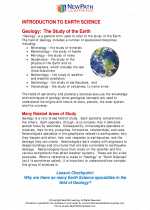 Introduction to earth science
Introduction to earth science  Activity Lesson
Activity Lesson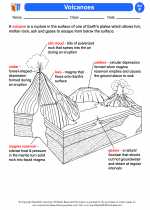 Volcanoes
Volcanoes  Worksheet/Answer key
Worksheet/Answer key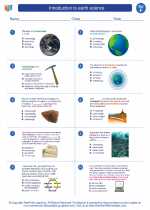 Introduction to earth science
Introduction to earth science  Worksheet/Answer key
Worksheet/Answer key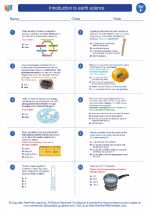 Introduction to earth science
Introduction to earth science  Worksheet/Answer key
Worksheet/Answer key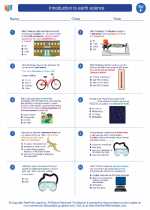 Introduction to earth science
Introduction to earth science  Vocabulary/Answer key
Vocabulary/Answer key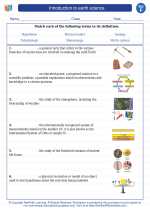 Introduction to earth science
Introduction to earth science  Vocabulary/Answer key
Vocabulary/Answer key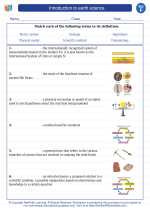 Introduction to earth science
Introduction to earth science 

 Activity Lesson
Activity Lesson
 Worksheet/Answer key
Worksheet/Answer key
 Worksheet/Answer key
Worksheet/Answer key
 Worksheet/Answer key
Worksheet/Answer key
 Vocabulary/Answer key
Vocabulary/Answer key
 Vocabulary/Answer key
Vocabulary/Answer key

The resources above cover the following skills:
EARTH AND SPACE SCIENCE